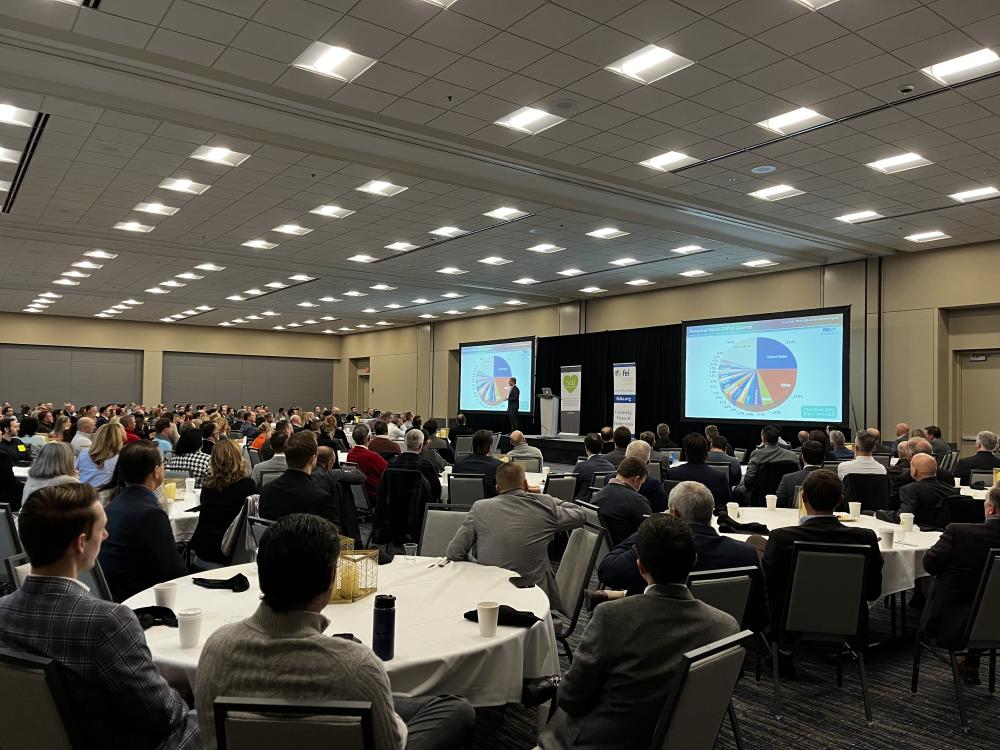

The U.S. economy remained essentially flat in 2023 with 0.2 percent growth through November compared with the same period in 2022, ITR Economics Senior Forecaster Connor Lokar told ACG’s Jan. 12 breakfast meeting audience.
Lokar titled his presentation “2024-2025 Anticipating Business Cycle Changes.” He warned that 2024 will bring “the majority of the pain for the majority of the businesses represented in this room ... not catastrophically but to a mild extent.” ITR Economics forecasts a mild recession in the U.S. and globally in 2024.
“Economic surprises are not good,” he said. “That’s my job this morning, to the extent that I can, (to) take surprise off the table and empower you with information about where we are and where we’re going this year.”
Problematically high interest rates, wage inflation and inflation are lingering. Corporate profits are decreasing. Commercial markets remain solid for 2024, but “beware 2025.” Distribution, manufacturing and the general economy had “an OK year in 2023,’ he said, “but I would be more concerned for you in 2024.”
Lokar sought to temper the gloomy outlook for 2024: It won’t replicate the Great Recession of 2008 and 2009. But the external market will be less accommodating overall.
“We’re not in the good old days of 2021 and 2022 and, to a varying sense, 2023, where there was way too much market demand chasing not enough capacity, not enough people, not enough product, not enough material,” he said. “It’s going to get hard. A lot of you have already felt that. That was creeping into your businesses probably more acutely in the third and fourth quarters of last year. And if you’ve tried to shrug that away—oh, it’s seasonal; my customers (are in) year-end cash conservation; they’re going to buy again in full throttle in the first quarter of this year—I would dissuade you away from that.
“This is a market issue,” he said. “This is a cyclical issue. This is a macro issue in an external environment. ... But if we are riding the economic road where it takes us, our hands are off the management steering wheel, and we’re just going to ride the economic curves where they take us, at this meeting next year we’re probably not going to love the year we’re looking back on in 2024. We have to make sure we are adapting with the changing business cycle environment and be ready to fight, be ready to sell, be ready to hunt again as opposed to waiting with open arms for business that has been overwhelming us for two or three years since we came out of the shutdowns in 2020.”
The economic deceleration in 2023 eased some major external problems that were largely out of people’s control: supply chain, inflation and labor. They all statistically improved last year. Decreased demand eased supply pressures in the U.S. and global economies to pre-pandemic levels.
“The supply chain excuse that was a pretty consistent paper-over comment in past three years is no longer valid in 2024,” Lokar said.
His presentation included numerous slides showing various economic measures domestically and globally. These included:
Macroeconomic signals for 2024:
- U.S. and global economies decelerated in 2023.
- Decline is probable in 2024.
- Leading indicators are starting to increase.
Uncertainty drivers:
- Higher interest rates pose a threat.
- Wage inflation is pressuring the margins.
- Corporate profits are decreasing.
Highlights:
- Opportunities exist.
- Commercial markets are solid for 2024.
- But commercial markets lag for 2025.
Top 10 countries for percentages of world GDP:
- United States: 25.4%
- China: 17.9%
- Japan: 4.2%
- Germany: 4.1%
- India: 3.4%
- United Kingdom: 3.1%
- France: 2.8%
- Russia: 2.2%
- Canada: 2.1%
- Italy: 2.0%
“The U.S. is still far and away the largest economy on earth,” he said. “We’re not drinking the inevitability of China Kool-Aid.”
Japan’s contracting demographics, for example—decreased population—have dampened their economic strength. Lokar said that from a global economic perspective, he wasn’t “rah-rah on the U.S. I think we’re the least ugly duckling going forward.” India is now the most populous country. He said he was “bullish on India for the next 20 to 30 years.”
The $36 trillion U.S. debt is a “bomb” that will go off, not this year but in 2030, and will “manifest itself as a global depression. ... We cannot do this indefinitely. We don’t have the tax base to support it.”
“Insane deficits” the past few years make pre-pandemic deficits seem desirable. But no one wants to address it. And it’s a federal, state and local issue.
“No one’s going to save you,” Lokar said. “The government’s not going to save you. You have to plan for your family and yourself. ... Homes and other hard assets are the only way to protect yourself in an inflationary environment.”
During the program’s question-and-answer segment following Lokar’s main presentation, an audience member asked whether he saw a depression-creating event in 2030. He said he saw no single “catalyst that blows it up.”

Register by January 14 to maximize value, elevate your experience, and get a head start connecting with 3,200+ dealmakers and executives.
